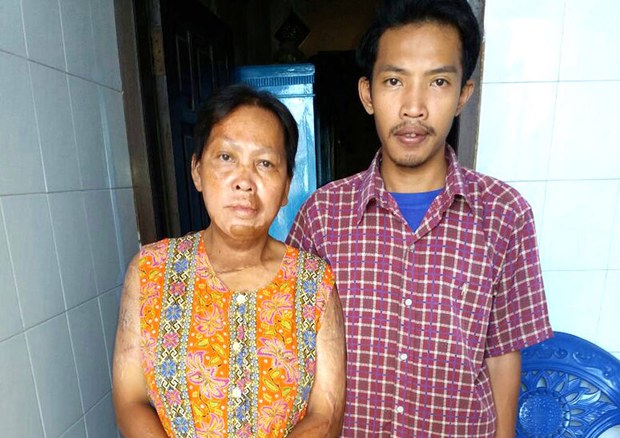Indonesia: Bali Bombing Victim Says Government Has Forgotten Her
2016.05.25
Jakarta
 Chusnul Chotimah, a survivor of the 2002 Bali bombings, stands with her son, Musoffa Adha, at their home in Sidoarjo, East Java, May 15, 2016.
Chusnul Chotimah, a survivor of the 2002 Bali bombings, stands with her son, Musoffa Adha, at their home in Sidoarjo, East Java, May 15, 2016.
Nearly 14 years later, Bali bomb victim Chusnul Chotimah says she’s still waiting for the Indonesian government to help pay for surgery and drugs needed to treat her injuries from the attack.
“Do I have to come to Jakarta and sleep in front of the State Palace only to attract the president’s attention? If they refuse to help, I would request for their help to just euthanize me. I have no power to live like this anymore,” Chusnul told BenarNews.
Chusnul was badly burned and disfigured in one of two bombings on Bali on Oct. 12, 2002, and has shrapnel embedded in one of her legs. Jemaah Islamiyah, a militant group linked with al-Qaeda, claimed responsibility for the twin attacks in Bali’s Kuta tourist district that killed 202 people.
Chusnul, who was living in Bali at the time, was buying food with a friend in Legian Street when a bomb went off inside Paddy’s Bar, some 100 meters (328 feet) away.
Chusnul has since returned to her home village of Sidoarjo, in East Java province, where she earns a meager living selling vegetables.
Some money from a Balinese NGO, which helped her to pay for an operation in Australia soon after the attack, ran out long ago and she is deeply indebted to a money lender who loaned her cash for other medical treatments, Chusnul said.
“Sixty percent of my body suffered burn injuries, including my face,” she said in a phone interview.
“Now my debt has reached Rp. 128 million [U.S. $9,370].”
But Chusnul is not alone, according to Dwi Welasih, an activist with the Indonesian Survivor Foundation (YPI), an NGO that supports victims of terrorist attacks.
“Besides Chusnul, there are many others in need of medical treatment. We have tried to talk to the Ministry of Health, but still have had no further response,” Dwi, who was injured in the deadly bombing of the Marriott Hotel in Jakarta in 2003, told BenarNews.
“I feel sad because we can’t do much about it. The organization has sought assistance from the Witness and Victim Protection Agency (LPSK), but the procedures are tight, so we still don’t see any aid provided for the victims,” Dwi added.
‘Where is the money?’
Chusnul has sent three letters to Indonesian President Joko “Jokowi” Widodo, but said she was still waiting for help from his administration. Four months ago, an official from the State Secretary’s office acknowledged one of the letters and promised that the government would aid her, she said.
According to Chusnul’s son, Musoffa Adha, 24, his mother has yet to receive Rp. 20 million (U.S. $1,467) allocated by the government to injured Indonesian survivors of the Bali attack, via the nation’s hospital system.
“Where is the money my mother supposedly received? When my father demanded an answer from the hospital, they declined, saying they have no idea about it,” Musoffa told BenarNews.
“My goal is to bring about another surgery for my mother because she always feels pain in her injured leg. With the rest of the money collected, we have planned to start a food stall, so she doesn’t have to sell vegetables around the village anymore,” he added.
Apart from feeling humiliated when people in the village ask her about the scars on her face, Chusnul said some conservative Muslim residents had come to look down on her and her family because they had lived in Bali, considered a hive of immorality and hedonistic activity.
“Several of my friends blamed my mother for working in a tourism island like Bali, though she earned money in a halal way for the sake of her children,” Musoffa said.
No special institution
Responding to questions about Chusnul’s case, Oscar Primadi, a spokesman for Indonesia’s Health Ministry, told BenarNews on May 20 that he had not been informed about it.
He said he would check into her case, adding that the she could also claim public health services and benefits through the Healthcare and Social Security Agency (BPJS), which is open to all Indonesians.
Ahmad Yunianto, chairman of the Crisis Management Centre at the ministry, explained that no special institution had been established in Indonesia to assist victims of terrorist attacks.
“It should be part of the obligations of [every] local government’s health or social agency, particularly in giving assistance for an individual and their longtime medical treatment,” he told BenarNews.







